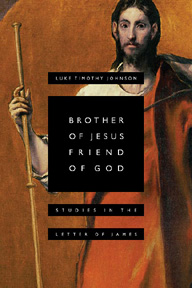Brother of Jesus, Friend of God

Luke Timothy Johnson, Brother of Jesus Friend of God: Studies in the Letter of James. Grand Rapids, Michigan: William B. Eerdmans Publishing, 2004. 263 pgs.
More studies in James, for the same reason as the last review I did of such a book. This time, however, I had a much better idea of what I was getting into. Johnson is an author I have read several times before. The first book I read by him was his commentary on Luke in the "Sacra Pagina" series. It was for an assignment in my introduction to Christianity course in my undergrad at UofA, and it was one of the books I used that was not on the recommended reading list. It was also the best commentary on Luke that I used, and remains so to this day. Next I came across his Writings of the New Testament. This turned out to be another excellent volume. To cut the story short, my history with reading Johnson meant that I was quite happy to find this book on James in the course of choosing material for this study.
Brother of Jesus is not, however, a commentary. It is a series of essay on James which cover a wide range of topics beginning with the (oh, so common) issues of canonicity, authorship, and dating and moving on to several much more interesting studies such as: The use of Leviticus 19 in James, the mirror of remembrance, and taciturnity and true religion (among others). Through the course of the book, though not a commentary, Johnson seeks to provide a fairly complete exploration of major issues in James, and he succeeds admirably in this goal.
Now, if I had been reading this book for academic purposes I would likely have been very glad to have the first five essays in this book. They cover the history of interpretation, the book's reception in the early church, its history specifically in the Greek and Latin early churches, and an analysis of the social world of James based on literary and historical reconstruction. Since I was not reading this book for academic purposes but, rather, for both pleasure and bible study purposes, these essays dragged on quite a bit longer than was strictly necessary. Though interesting in their own right, the reader would not be handicapped in understanding later chapters by skipping most of these (maybe just read the survey of the history of interpretation of James, the first essay).
Despite the slow beginning Johnson does not disappoint. As biblical, cultural, and theological analysis, it is as good as the rest of his work that I have read. That is to say, he provides interesting and thorough analysis of several specific issues in James. He offers eye-opening insights into several points of theology and, most of all, he brings the book to life. I can honestly say that my reading of James has never been so rich nor deep. Of particular interest was the way in which Johnson continually shifts the reader away from the common focus on James 2:14-26 (Faith and Works, or deeds as some translations put it, vs. Paul's teaching on the same thing) and towards what he views as the proper center of the book: James 4:4 and surrounding verses on the theme of "Friendship with God".
If your interested in a deeper and fuller view of James and what he has to say to us, look no further. Johnson delivers. Read and enjoy.
One more thing though. In his epilogue, entitled "The Importance of James for Theology," Johnson adds this telling point, drawn from a combination of James main theme of friendship with God and several sub-themes, including proper language (or use of the tongue) and proper attitudes towards wealth and earthly possessions:
"The church ought always to be the strongest and most convincing critic of this 'way of the world.' The church, both in its speech and in its practice, ought to represent 'friendship with God' in its rejection of consumerism and commodification. But it is a serious question whether the church today - at least in those places where capitalism reigns supreme - can exercise the prophetic voice to which James summons it. Is not the church itself so compromised by its own embrace of commercial language and practice - if not always in strictly monetary terms, certainly in terms of its zeal for program over presence, for success over fruitfulness, for influence over truthful witness - that the language of James needs first to be turned toward the church itself for self-examination?"
Got me thinking. Why do we always try to 'sell Christianity'?
Comments